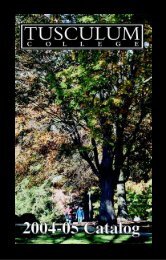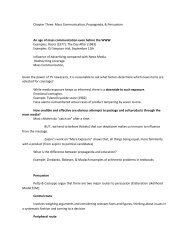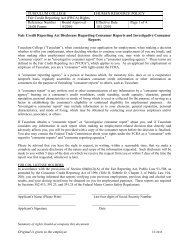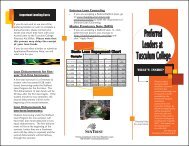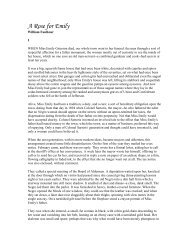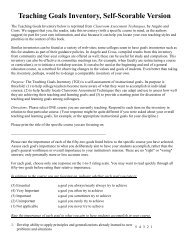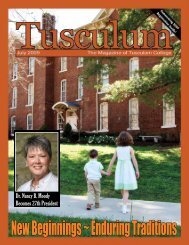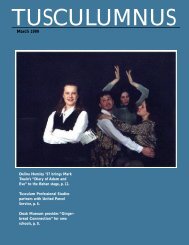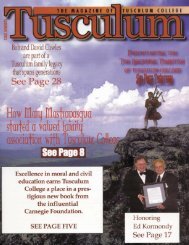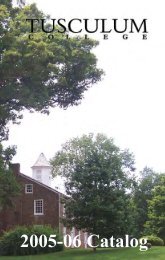WANTED
wanted - Tusculum College
wanted - Tusculum College
- No tags were found...
Create successful ePaper yourself
Turn your PDF publications into a flip-book with our unique Google optimized e-Paper software.
work. And when Gaines returned to the classroom and began teaching, he’d find that his Civil War<br />
maps inexplicably included site names from Vietnam or other such unexpected locales.<br />
In the 1970s, the two professors enrolled in the Ph.D. program at the University of Tennessee, and as<br />
Dr. Sexton puts it, “ran the roads between here and Knoxville before the Interstate was the Interstate.”<br />
Dr. Sexton received his Ph.D. in 1976.<br />
Dr. Sexton perceives differences both positive and negative between Tusculum College students of<br />
the 1960s and more recent years. “Students then were less indulged than they are today. Students<br />
today strike me as much more dependent on me as a teacher than they used to be,” he says.<br />
Dr. Sexton recalls a time during his early days at the College when an area barber refused to cut the<br />
hair of a black student. Tusculum College students as a group decided to boycott the barbershop. In<br />
those days a boycott was a radical step, but today’s students see resistance to discrimination as standard<br />
practice, indicating one difference in the times that Dr. Sexton sees as positive.<br />
Today’s students are “more socially aware of each other now than when I first came here,” Dr. Sexton<br />
says. “I think they accept the notion that equality is a value they should have.”<br />
One of the factors affecting Tusculum College students in Don<br />
Sexton's earliest teaching days was the war in Vietnam. To<br />
“flunk out” of college was, for a young man, to face the possibility<br />
of wartime military draft.<br />
Tusculum College faculty members were mindful of this. “I don’t<br />
think any of us wanted to be the teacher who failed a student who<br />
then had to go on to Vietnam and maybe be killed,” Dr. Sexton says.<br />
Today Dr. Sexton is grateful that none of his students, to his<br />
knowledge, died in Vietnam. But he knew several who served<br />
there and were harshly impacted by their experiences.<br />
Looking back over his 40 years at Tusculum College, Dr.<br />
Sexton sees a few pivotal moments. One was the start of the<br />
Douglas Trout presidency. Trout sought to transform Tusculum<br />
College into a stronger institution with a better potential for<br />
growth and student retention.<br />
Similarly, the beginning of the Robert Knott administration<br />
after a period of financial, administrative and academic stress at<br />
the College was also a watershed moment in the College’s history,<br />
Dr. Sexton believes.<br />
The feeling Dr. Sexton had at the time was that Tusculum College needed an opportunity to “reinvent<br />
itself,” he says. A healthy psychology began to prevail among the Tusculum College faculty as the new<br />
administration brought in ideas such as the block system of classes and the Civic Arts emphasis.<br />
“At that time, faculty support of the block system was enthusiastic,” he recalls. “There was a sense<br />
that nothing could stop us, that we could do anything.”<br />
One adjustment the block system forced upon history teachers at Tusculum was making them be<br />
more evaluative of what was truly important in the history being taught, he says. Because of the<br />
amount of ground that had to be covered within a block, it wouldn’t do to merely blanket the students<br />
with more data than could be absorbed. The teacher had to decide what really mattered, and concentrate<br />
on teaching that, Dr. Sexton says.<br />
He has a vision of the Tusculum College he would like to see if he could time-travel another 40 years<br />
into the future. “I’d like to see it be a stable undergraduate program with a non-traditional adult<br />
program. I’d like to see a stable student body. I’d like to see a student body more intellectually engaged<br />
than it is right now. And I’d like to see the College with a $50 million or $70 million endowment. And<br />
I’d like to see a faculty where the students and faculty are still in contact with each other and the faculty<br />
is concerned with the welfare of the students.”<br />
Though Dr. Sexton admits he would love to see more students major in history, his greater concern is<br />
11



